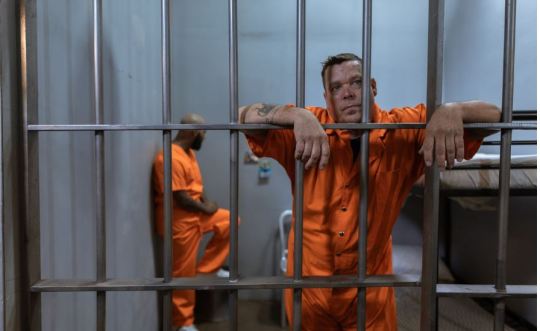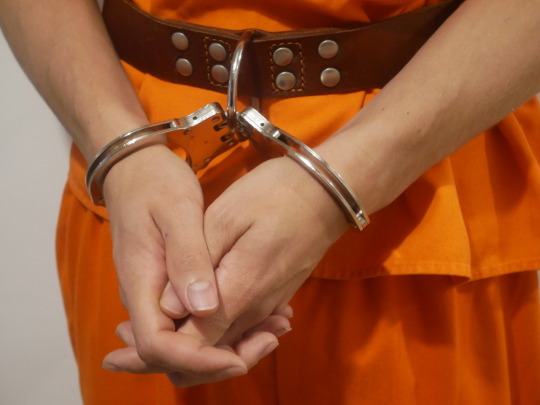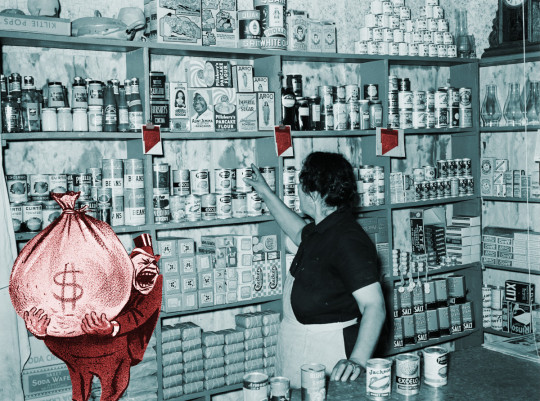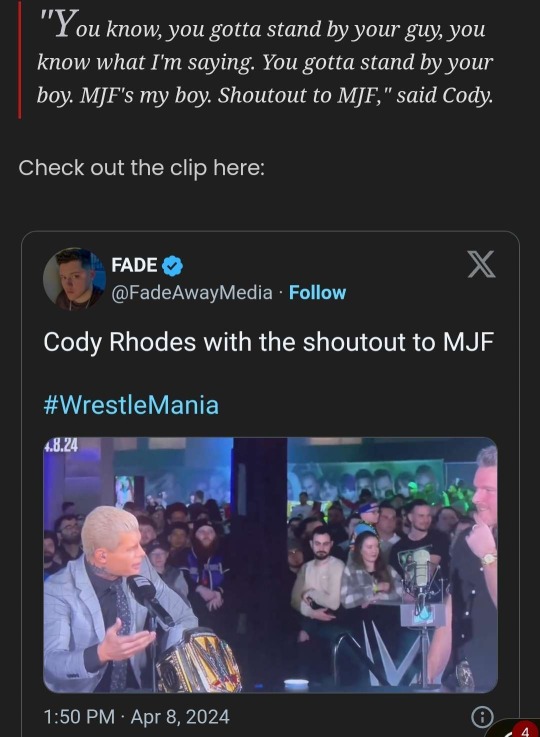#American jail
Text

A CRUCIAL TOOL OF DISCIPLINE IN MOST AMERICAN PRISONS: THE LEATHER WAIST BELT WITH STEEL HANDCUFFS IN FRONT
Well, let's start with a simple pic, which i like very much: a new prisoner, presumably just arrested a few days before, brought to the court-house for trial by two police-officers. They just brought them there with the car you see on the background.
This is always a very humiliating moment for a new prisoner, who in this case indeed does not look very happy. He now has to bridge the distance from the car to the front door of the courthouse, in full view of family, random onlookers and - if the crime for which he is to appear appeals to the imagination - often also the local (sometimes even national) press: the so-called perp walk. This can be just a few meters, but sometimes also a considerable distance.
The suspect no longer appears in his own civilian clothes, but has already put on a prison uniform. Presumably he was forced to wear it immediately after his incarceration in the local jail, prior to his first night behind bars.....

The bright orange color makes him very visible and makes him contrast sharply with the police officers behind him and all bystanders.
The stigmatizing effect of this will not go unnoticed by the wearer of this uniform: it clearly separates the (not yet convicted) criminal from the civil society that will soon keep him behind impenetrable concrete walls for many months or even many years because of the crime he has committed. from a state prison. The forced wearer of such a uniform immediately feels like an inmate, and it influences his mindset and his behavior. It often automatically makes them a bit more docile.
For this uniform, the prison has not opted for a so-called two-piece, trousers and shirt, but for a very basic one-piece jumpsuit, which is simply closed at the front with a row of six or seven silver-colored press studs one above the other. This was indeed done neatly, in accordance with prison regulations, so that the top snap button is not clearly visible. This also applies to the bottom one(s) for another reason. These jumpsuits are often much too big and fit around the wearer like a bag. But it fits well here - and it looks good on him too, I must add.
Most prisoners - but they don't have a say in that - would prefer a two-piece, because it is more practical and you look even more out of place in such a jumpsuit, especially with that row of clearly visible press studs on top of each other. Its compulsory wearing is experienced by many as extra humiliating. Perhaps this also plays a conscious role for the prison authorities, but such a jumpsuit is moreover considered 'safer' because it is more difficult to hide everything in it.
The guy is of course extra recognizable as a prisoner because, as is prescribed in almost all states for the transport of prisoners (and often also in court), he is carefully handcuffed. He wears a wide leather belt around his waist, to which a set of handcuffs is attached in a very simple but effective manner in the middle of the front. This combination is very effective in making any possible attempt at resistance impossible. There are circulating on the internet many pics showing inmates in court shackled this way, like this one.

Only after the belt is placed, with the buckle out of reach of his side at the rear, the cuffs are put on. At the front, where on a normal belt the buckle would be, there is fixed a large steel D-ring that protrudes straight forward. The D-Ring is wide enough to pull an open cuff through it. The short connecting chain between the two separate cuffs then passes through this D-ring, so that one handcuff hangs down on each side. Only thereafter are the handcuffs themselves placed on the prisoner's wrists one by one.
With that they are immediately inextricably attached to the belt, because the prisoner can now no longer possibly free himself from this situation – nor from the shackles, nor from the grip of the D-ring on his shackles. He is forced to keep his hands low in front of his crotch all the time, because the D-ring plus the short chain offer little room for maneuver. He can no longer do anything dangerous with them, and it is also completely impossible for him to hold them in front of his face to avoid the curious eyes of onlookers.

I’ve here inserted a photo of another prisoner in the courtroom itself, this time in a two-piece uniform, which clearly shows how in fact a normal belt has been reversed, with the buckle at the back. In addition, I deliver underneath a detailed photo that shows much better how exactly the handcuffs are attached. A video is also circulating on the Internet, showing how a brand new juvenile detainee is handcuffed in this way immediately after he has had to change clothes and put on his new (this time black-and-white striped) prison uniform. See: https://www.youtube.com/watch?v=9vzE4JSmzLw

An alternative to the leather belt with handcuffs consists of a steel chain around the waist, to which the handcuffs are attached, sometimes in advance, sometimes on the side. The latter is a much more natural position than both hands right in front of your crotch. Although steel is more uncomfortable than leather, most prisoners - but of course they are never asked - seem to prefer it. This socalled belly-chain offers more freedom of movement, as you can with some physical flexibility move it up or down rather far. The belt is usually stuck to your waist. Because your belt is really fixed, so are your handcuffs. Even swearing an oath in court is this way difficult, as the pic underneath shows. Of course, seen from the opposite perspective, it is very safe and therefore convenient for the guards.

Many prisoners find having to wear such a leather belt, to which the handcuffs are attached by inserting them through the D-ring, and in which case the handcuffs after locking also automatically are attached to the belt too, more humiliating than a belly-chain with handcuffs on it. It feels a bit like being a dog on a leash. The belt indeed can offer a good grip for the guard...

Moreover, a leather belt around the waist is traditionally a symbol of male pride and self-confidence, hence the striking buckles in cowboy culture. There, such a belt embodies male freedom. And that male symbol of freedom is turned into its opposite here: by attaching his handcuffs, to a prisoner it becomes the symbol of his loss of freedom, of his powerlessness.
The photo ends just above the prisoner's knees. Although his feet are not raised, it is almost certain that he is, as its called, 'fully restrained', meaning that in addition to the belt and handcuffs, he is also wearing foot cuffs. That is the standard combination, especially for prisoners on transport. Naturally, these were also applied to the video clip just now. There is little chance that they were omitted in this case. Also he will thus have looked like this outside on the street.

#American Prison#prisonexperience#prison#jail#prisoner#prison uniform#shackles#chains#handcuffs#restrained#full restraints#prison jumpsuit#perp walk#inmate#handcuffed inmate#prisoner transport#American jail#orange prison jumpsuit
178 notes
·
View notes
Text
The one weird monopoly trick that gave us Walmart and Amazon and killed Main Street

I'm coming to BURNING MAN! On TUESDAY (Aug 27) at 1PM, I'm giving a talk called "DISENSHITTIFY OR DIE!" at PALENQUE NORTE (7&E). On WEDNESDAY (Aug 28) at NOON, I'm doing a "Talking Caterpillar" Q&A at LIMINAL LABS (830&C).

Walmart didn't just happen. The rise of Walmart – and Amazon, its online successor – was the result of a specific policy choice, the decision by the Reagan administration not to enforce a key antitrust law. Walmart may have been founded by Sam Walton, but its success (and the demise of the American Main Street) are down to Reaganomics.
The law that Reagan neutered? The Robinson-Patman Act, a very boring-sounding law that makes it illegal for powerful companies (like Walmart) to demand preferential pricing from their suppliers (farmers, packaged goods makers, meat producers, etc). The idea here is straightforward. A company like Walmart is a powerful buyer (a "monopsonist" – compare with "monopolist," a powerful seller). That means that they can demand deep discounts from suppliers. Smaller stores – the mom and pop store on your Main Street – don't have the clout to demand those discounts. Worse, because those buyers are weak, the sellers – packaged goods companies, agribusiness cartels, Big Meat – can actually charge them more to make up for the losses they're taking in selling below cost to Walmart.
Reagan ordered his antitrust cops to stop enforcing Robinson-Patman, which was a huge giveaway to big business. Of course, that's not how Reagan framed it: He called Robinson-Patman a declaration of "war on low prices," because it prevented big companies from using their buying power to squeeze huge discounts. Reagan's court sorcerers/economists asserted that if Walmart could get goods at lower prices, they would sell goods at lower prices.
Which was true…up to a point. Because preferential discounting (offering better discounts to bigger customers) creates a structural advantage over smaller businesses, it meant that big box stores would eventually eliminate virtually all of their smaller competitors. That's exactly what happened: downtowns withered, suburban big boxes grew. Spending that would have formerly stayed in the community was whisked away to corporate headquarters. These corporate HQs were inevitably located in "onshore-offshore" tax haven states, meaning they were barely taxed at the state level. That left plenty of money in these big companies' coffers to spend on funny accountants who'd help them avoid federal taxes, too. That's another structural advantage the big box stores had over the mom-and-pops: not only did they get their inventory at below-cost discounts, they didn't have to pay tax on the profits, either.
MBA programs actually teach this as a strategy to pursue: they usually refer to Amazon's "flywheel" where lower prices bring in more customers which allows them to demand even lower prices:
https://www.youtube.com/watch?v=BaSwWYemLek
You might have heard about rural and inner-city "food deserts," where all the independent grocery stores have shuttered, leaving behind nothing but dollar stores? These are the direct product of the decision not to enforce Robinson-Patman. Dollar stores target working class neighborhoods with functional, beloved local grocers. They open multiple dollar stores nearby (nearly all the dollar stores you see are owned by one of two conglomerates, no matter what the sign over the door says). They price goods below cost and pay for high levels of staffing, draining business off the community grocery store until it collapses. Then, all the dollar stores except one close and the remaining store fires most of its staff (working at a dollar store is incredibly dangerous, thanks to low staffing levels that make them easy targets for armed robbers). Then, they jack up prices, selling goods in "cheater" sizes that are smaller than the normal retail packaging, and which are only made available to large dollar store conglomerates:
https://pluralistic.net/2023/03/27/walmarts-jackals/#cheater-sizes
Writing in The American Prospect, Max M Miller and Bryce Tuttle1 – a current and a former staffer for FTC Commissioner Alvaro Bedoya – write about the long shadow cast by Reagan's decision to put Robinson-Patman in mothballs:
https://prospect.org/economy/2024-08-13-stopping-excessive-market-power-monopoly/
They tell the story of Robinson-Patman's origins in 1936, when A&P was using preferential discounts to destroy the independent grocery sector and endanger the American food system. A&P didn't just demand preferential discounts from its suppliers; it also charged them a fortune to be displayed on its shelves, an early version of Amazon's $38b/year payola system:
https://pluralistic.net/2022/11/28/enshittification/#relentless-payola
They point out that Robinson-Patman didn't really need to be enacted; America already had an antitrust law that banned this conduct: section 2 of the the Clayton Act, which was passed in 1914. But for decades, the US courts refused to interpret the Clayton Act according to its plain meaning, with judges tying themselves in knots to insist that the law couldn't possibly mean what it said. Robinson-Patman was one of a series of antitrust laws that Congress passed in a bid to explain in words so small even federal judges could understand them that the purpose of American antitrust law was to keep corporations weak:
https://pluralistic.net/2023/04/14/aiming-at-dollars/#not-men
Both the Clayton Act and Robinson-Patman reject the argument that it's OK to let monopolies form and come to dominate critical sectors of the American economy based on the theoretical possibility that this will lead to lower prices. They reject this idea first as a legal matter. We don't let giant corporations victimize small businesses and their suppliers just because that might help someone else.
Beyond this, there's the realpolitik of monopoly. Yes, companies could pass lower costs on to customers, but will they? Look at Amazon: the company takes $0.45-$0.51 out of every dollar that its sellers earn, and requires them to offer their lowest price on Amazon. No one has a 45-51% margin, so every seller jacks up their prices on Amazon, but you don't notice it, because Amazon forces them to jack up prices everywhere else:
https://pluralistic.net/2024/03/01/managerial-discretion/#junk-fees
The Robinson-Patman Act did important work, and its absence led to many of the horribles we're living through today. This week on his Peoples & Things podcast, Lee Vinsel talked with Benjamin Waterhouse about his new book, One Day I’ll Work for Myself: The Dream and Delusion That Conquered America:
https://athenaeum.vt.domains/peoplesandthings/2024/08/12/78-benjamin-c-waterhouse-on-one-day-ill-work-for-myself-the-dream-and-delusion-that-conquered-america/
Towards the end of the discussion, Vinsel and Waterhouse turn to Robinson-Patman, its author, Wright Patman, and the politics of small business in America. They point out – correctly – that Wright Patman was something of a creep, a "Dixiecrat" (southern Democrat) who was either an ideological segregationist or someone who didn't mind supporting segregation irrespective of his beliefs.
That's a valid critique of Wright Patman, but it's got little bearing on the substance and history of the law that bears his name, the Robinson-Patman Act. Vinsel and Waterhouse get into that as well, and while they made some good points that I wholeheartedly agreed with, I fiercely disagree with the conclusion they drew from these points.
Vinsel and Waterhouse point out (again, correctly) that small businesses have a long history of supporting reactionary causes and attacking workers' rights – associations of small businesses, small women-owned business, and small minority-owned businesses were all in on opposition to minimum wages and other key labor causes.
But while this is all true, that doesn't make Robinson-Patman a reactionary law, or bad for workers. The point of protecting small businesses from the predatory practices of large firms is to maintain an American economy where business can't trump workers or government. Large companies are literally ungovernable: they have gigantic war-chests they can spend lobbying governments and corrupting the political process, and concentrated sectors find it comparatively easy to come together to decide on a single lobbying position and then make it reality.
As Vinsel and Waterhouse discuss, US big business has traditionally hated small business. They recount a notorious and telling anaecdote about the editor of the Chamber of Commerce magazine asking his boss if he could include coverage of small businesses, given the many small business owners who belonged to the Chamber, only to be told, "Over my dead body." Why did – why does – big business hate small business so much? Because small businesses wreck the game. If they are included in hearings, notices of inquiry, or just given a vote on what the Chamber of Commerce will lobby for with their membership dollars, they will ask for things that break with the big business lobbying consensus.
That's why we should like small business. Not because small business owners are incapable of being petty tyrants, but because whatever else, they will be petty. They won't be able to hire million-dollar-a-month union-busting law-firms, they won't be able to bribe Congress to pass favorable laws, they can't capture their regulators with juicy offers of sweet jobs after their government service ends.
Vinsel and Waterhouse point out that many large firms emerged during the era in which Robinson-Patman was in force, but that misunderstands the purpose of Robinson-Patman: it wasn't designed to prevent any large businesses from emerging. There are some capital-intensive sectors (say, chip fabrication) where the minimum size for doing anything is pretty damned big.
As Miller and Tuttle write:
The goal of RPA was not to create a permanent Jeffersonian agrarian republic of exclusively small businesses. It was to preserve a diverse economy of big and small businesses. Congress recognized that the needs of communities and people—whether in their role as consumers, business owners, or workers—are varied and diverse. A handful of large chains would never be able to meet all those needs in every community, especially if they are granted pricing power.
The fight against monopoly is only secondarily a fight between small businesses and giant ones. It's foundationally a fight about whether corporations should have so much power that they are too big to fail, too big to jail, and too big to care.

Community voting for SXSW is live! If you wanna hear RIDA QADRI and me talk about how GIG WORKERS can DISENSHITTIFY their jobs with INTEROPERABILITY, VOTE FOR THIS ONE!

If you'd like an essay-formatted version of this post to read or share, here's a link to it on pluralistic.net, my surveillance-free, ad-free, tracker-free blog:
https://pluralistic.net/2024/08/14/the-price-is-wright/#enforcement-priorities
#pluralistic#Robinson-Patman Act#ftc#alvaro bedoya#monopoly#monopsony#main street#too big to jail#too big to care#impunity#regulatory capture#prices#the american prospect#Max M Miller#Bryce Tuttle#a and p#wright patman
2K notes
·
View notes
Text

#vote blue#vote democrat#please vote#voting#election 2024#get out the vote#american politics#us elections#kamala harris#white criminal#white man in prison#trumpy dumpy#it all falls down#prison#jail#prison uniform#prisoner#inmate#vote biden#vote kamala#kamala 2024#kamala for president#harris#president#presidential#election#vote harris#harris 2024#kamala#tim walz
93 notes
·
View notes
Text

LETS. GO.
#trump#Donald Trump#politics#convicted felon#american politics#America#supernatural#supernatural meme#LETS GO GIRLS#I know he probably won’t go to jail for a while#BUT STILL#CONVICTED
95 notes
·
View notes
Text
god i’m so SICK of how people switched up on gypsy rose, especially now that she’s pregnant. the amount of comments that say “hope her child does to her what she did to her mom”??? are we forgetting HER MOM tortured her for years, declared her mentally unstable so that she couldn’t tell anyone about the abuse?? (she tried going to the police but because she was mentally incompetent on paper, the police brought her back home). gypsy is going to be physically affected by the DECADES of this forever, her brain was affected by the medication too.
gypsy’s mom is literally suspected of killing her own mom, and gypsy was confined to a wheelchair by the end, very likely to be next.
also, disgusting how everyone was so supportive when she got out of jail but now that she’s not behaving like they want her to, suddenly everyone has conveniently forgotten that she wasn’t ‘not getting along with her mom’, she was mentally and physically abused almost to the brink of death for twenty years. disgusting.
everyone supports long term abuse victims until they’re not a perfect picture of imagination. when has the world become incapable of processing that humans have complex emotions & are complex themselves? do better.
#‘and her bf is in jail unlike her’#‘even tho he’s severely autistic and she pushed him’#maybe focus on how terrible american justice system is????#instead of being horrible to a victim who SERVED her time too#gypsy rose blanchard#and the jokes i see about her ???#gross
78 notes
·
View notes
Text



Shirtless Sagger being Handcuffed and arrested over an assault, Bet he’s ready for jail 😉
#saggin#saggin pants#sagginboys#sagging#saggerscuffed#inmate#jail#prisoner#saggingboysgpingtojail#american eagle
78 notes
·
View notes
Note
sk police rn: everyone drop what ur doing. some kid on tumblr is smoking WEED 🚨🚨🚨 ALL UNITS REPORT WE NEED ALL TASK FORCES ON THIS NOW
😭
#american exceptionalism moment#the police here don't care about (*priveleged) people smoking weed but in the amazing and honourable south Korea they will definitely send#you to jail!!!!!!!#like no the cops dont gaf#random
32 notes
·
View notes
Text
hello my fellow tumblr stoners. i think today (juneteenth) is a great day to support and spread word about organizations like the weldon project, the last prisoner project, and the mission [green] initiative !
but.... why?
currently, those living in 24 out of the 50 states are free to possess and use cannabis for recreational use, with 13 more states having legalized the use of medical marijuana. despite this, ~40,000 people sit in american prisons for having been in possession of marijuana. though its difficult to even determine the exact number of individuals being wrongfully punished for cannabis possession, it's even more difficult to determine just how many of those prisoners are black. we do, however, know that black people are 3.64 times more likely to be arrested for marijuana possession. its also been found that, in 2020, 94% of individuals arrested for possession (within nyc's five boroughs) were BLACK.
so, why am i allowed to take an edible whenever i please, while thousands of innocent, black people are sitting in jail cells for doing the same thing? 24-37 state governments and their people have already decided that marijuana use should not be criminalized, meaning these prisoners have done no harm. that being said what makes them any different from you and i?
in america, we've seen some individuals, like weldon angelos be pardoned for their supposed crimes, but angelos also had the support of highly-visible celebrities like snoop dog and alicia keyes speaking up and demanding his freedom.
so, this juneteenth, stand up for thousands of innocent, black lives. donate to related organizations, discuss this issue with your loved ones, email your representatives, and speak up for those without a voice. after all, why buy that second bag of edibles when you could be saving someone's life?
#i hope i worded this ok#this is an issue very close to my heart#and this post doesnt even go into detail regarding how shitty american jails and prisons are
35 notes
·
View notes
Text

Think it's actually very funny that between phone transfers and mass deletions and whatnot I've lost all personal documentation of my bandito tour show except this image that I took when we were walking to our uber after the concert
#it's not a huge loss bc my phone camera at the time was horrible#if you've seen bandito era pics of josh with taco bell written on his chest#or the show where tyler had yellow tape on both ankles & was in navy blue#that was mine lol#twenty one pilots#tyler joseph#josh dun#*not my pictures i mean my show#anyway if they dont come back to my state for the presumed eventual 2nd north american leg of clancy im gonna ummmmmmmmmmmmmmmmmm be in jail#it's been since 2018 😭 which ik in the scheme of things is not that long but im a complainer
23 notes
·
View notes
Text





Conservatives are going to get mad again
#Conservatives are going to get mad again#the boys#tv series#series#conservatives#right wing politics#political#politics#government corruption#democrats are corrupt#biden corruption#corrupt gop#corrupt government#government#jail#slave owners#chattel slavery#slavery#slaves#exploitation#exploitative#usa news#usa is a terrorist state#usa politics#usa#american indian#american#america#amerikkka#amerika
22 notes
·
View notes
Text
The way codymax just immediately revived itself after this

#codymax coming back from war#getting flashbacks and I can’t do this anymore#codymax was my introduction to the ships in wrestling#other than rkbro samijey warjf max2 and cmjf as well#which in actuality is an insane grouping in my opinion#but yeah!!! why did he think this was okay after what they put me through before!!!#mjf#maxwell jacob friedman#cody rhodes#the american nightmare#codymax#jail for life#wwe#aew
21 notes
·
View notes
Note
So you think people voicing their disgust at your degenerate coomer pedo shipping bullshit is censorship? Surely that means you support freedom of speech then? How about this: you're a nigger and a faggot.
Real cute! You should say this again off anon :)
Anyway Steven and his Gem are getting married this weekend and I'm the best man at the wedding <3
#bestie I'm a black queer you think this is the first time I've been called a slur? bye lmao#Anyway when people ask why i dont like antis this is my answer#loser behavior fr fr#Also. for fucks sake. freedom of speech is not freedom of consequences#that law is 1) american 2) for federal purposes and 3) not a get out of jail free card#private companies can restrict their platforms and often do#that law exists to tell you that its okay to protest freely or express your dislike of political figures#it is not for private companies; thats what a TOS is for#and guess what! shipping isn't against any social media site's TOS!#anyway get educated and begone LOL#text.txt#nugget rambles#ask#anon#hall of shame#this chor again bet. smh
9 notes
·
View notes
Text
oh i just saw lando comment on trump presence at the gp and all my excitement for his win just disappeared. how can you be so disconnected from life. and don’t let me start talking about ben sulayem parading him around and making him greet the drivers
#i'm not american too but i know the basic shit that this man should be in jail#this you don't know anything about politics just don't talk about it#not suprised but still disappointed#lando norris#f1#formula 1#miami gp 2024#fia
15 notes
·
View notes
Text
”there’s gonna be a felon president” obviously I don’t fuck with Trump but it is unironically a good thing that you can still run for president as a felon or even from prison, that is unequivocally a positive for democracy also felons should be able to vote
#Like rare American W#If a criminal record can stop you from participating in the political process then people in power power can just jail the people#they want to disenfranchise
14 notes
·
View notes
Text
TERFS ARE NOT ALLOWED TO TALK ABOUT MAHSA AMINI OR MORALITY POLICE. GO FUCK YOURSELVES. I do not care how much you've "reasearched" on this topic. you're just hurting the protests and more women by your stupid ideologies.
you can not remove abuse to women without removing hatred to trans people first. it has been proven many times that anti-trans people laws have hurt cis women more.
you have no rights to talk about these issues. sit down and shut up. you are not helping women.
reblogs turned off because radfems n terfs found this post 💀
#just bloxked a terf with mahsa amini in their bio. ew. ew ew morality police is killing and jailing everyone from every gender.#there are women working for the morality police#it hurts all genders. sexes. people.#terfs kys challenge :/#mine#morality police#mahsa amini#terf#iran#its not even that hard to see why anti trans laws can harm more cis people than help them#like?? almost all of them will end in SA#trans#lgbtqa+#specially american terfs. ya'll 100% have no rjghts to talk over ieanian voices#and for iranian terfs? im just genuinely sorry for ya'll. dissapointed.
14 notes
·
View notes
Text
Whoever wishes this bitch a happy birthday KNOW you are an opp

#jinx#jinx manhwa#manhwa#bl manhwa#jinx bl#jaekyung jinx#I don’t even count it as a bl this time#it’s more like bv BOY VICTIM#Someone put him in jail#guilty that boy is guilty! hang him I got the rope right here!#i’m petty#idc if he’s pretty I’m PISSED#he can fight but I’m from American 🔫🔫#i hate him#for various reasons
15 notes
·
View notes